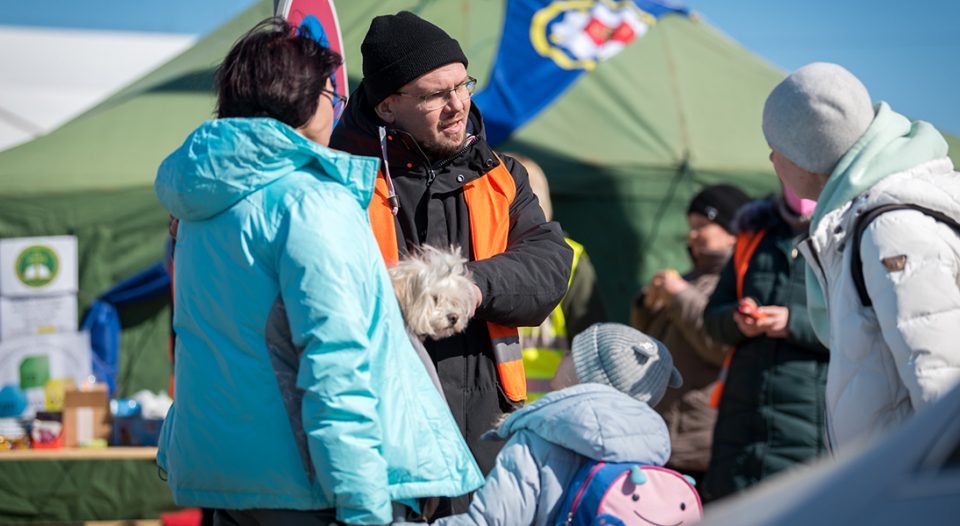One year ago, President Vladimir Putin of Russia ordered the invasion of Ukraine, killing thousands and displacing millions. Lutherans around the world have responded to the crisis with generosity and service.
“In the past year, we have received terrible news many times,” wrote Anne Burghardt, general secretary of the Lutheran World Federation (LWF), in an LWF tweet earlier today. “We have also witnessed so much hospitality to refugees, solidarity, and strong support for the people and churches of Ukraine.”
“The churches in the region and their diaconal agencies showed us what it means to welcome the stranger,” Burghardt wrote. “We are deeply grateful for their work and our collaboration in serving people in need. Despite everything, that is a sign of hope.”
On Ash Wednesday, the LWF launched its Lent campaign, “Seven Weeks for Peace,” on social media. Every Wednesday, the LWF will offer a prayer for peace in a country or region it works in, and in the following six days it will share posts on this work. The campaign launched with a focus on Ukraine, highlighting LWF World Service and the care it provides to Ukrainian refugees throughout Poland, in cooperation with local LWF member churches.
Today the LWF published an interview with Pavlo Shvarts, bishop of the German Evangelical Lutheran Church of Ukraine (GELCU), discussing the ways GELCU congregations have been providing aid to those in their communities who have been affected by the conflict.
“The churches in the region and their diaconal agencies showed us what it means to welcome the stranger.”
Amid one of the worst refugee crises in recent history, Lutheran Disaster Response’s (LDR) partners in the region similarly offered food, clothing, other supplies and housing to those displaced. LDR supporters have given more than $12 million to aid those in Eastern Europe whose lives were suddenly disrupted.
Today LDR published “War in Ukraine: Eastern Europe One Year Later,” a report highlighting the humanitarian aid and holistic refugee response LDR and its partners have offered over the last year. “We didn’t get involved in humanitarian aid in Ukraine because it was safe,” said Bevan Stein, humanitarian response coordinator for the Evangelical Lutheran Church of the Augsburg Confession in Slovakia, in the report. “We got involved because it’s where we felt God was leading us to go.”
With support from LDR, partners adapted quickly to address the new challenges resulting from the refugee crisis, especially for marginalized populations that faced additional obstacles when seeking assistance. The report highlights the ways in which LDR works with partners in Hungary to ensure that ethnic-minority Roma refugees and refugees with disabilities can access services and are treated with dignity. Through LDR support, the Evangelical Lutheran Church in Hungary hired additional staff to manage the increased caseload.
As the war has continued, organizations have adapted to the new needs of refugees. According to the report, an integration center in Bielsko-Biala, Poland, run by LWF and the Evangelical Church of the Augsburg Confession in Poland (ECACP), is one of six around the country where refugees from Ukraine can apply for cash assistance, access counseling and social services, and find child-friendly spaces for play.
“We didn’t get involved in humanitarian aid in Ukraine because it was safe. We got involved because it’s where we felt God was leading us to go.”
In a statement issued one year ago, an interreligious group of leaders that included ELCA Presiding Bishop Elizabeth Eaton declared, “All our religious traditions call us to pray and work for peace. We join our voices and hands together.” Over the last year, Living Lutheran has highlighted many ways members of the ELCA and its partner churches are doing such work.
In March 2022, Drahus Oslik, a pastor of Evangelical Lutheran Church in Waynesboro, Pa., was given humanitarian leave by the congregation to travel to his native Slovakia, where he provided pastoral counseling and translation services to war refugees at the border with Ukraine.
In another case, a friendship forged 20 years earlier at a Lutheran camp in southwestern Pennsylvania provided two families in Ukraine with an escape route to Germany. And a military veteran in Minnesota upended his life to become a long-term volunteer, delivering humanitarian aid near Lviv, in western Ukraine.
Elsewhere the first group of women ordained in the ECACP marked their ordination while simultaneously welcoming Ukrainian refugees in their congregations. Refugees were also welcomed by ELCA missionaries in Slovakia and through rescue missions at sea that were supported by ELCA World Hunger.
Contribute to LDR’s Eastern Europe Crisis Response at elca.org/ukraine.





